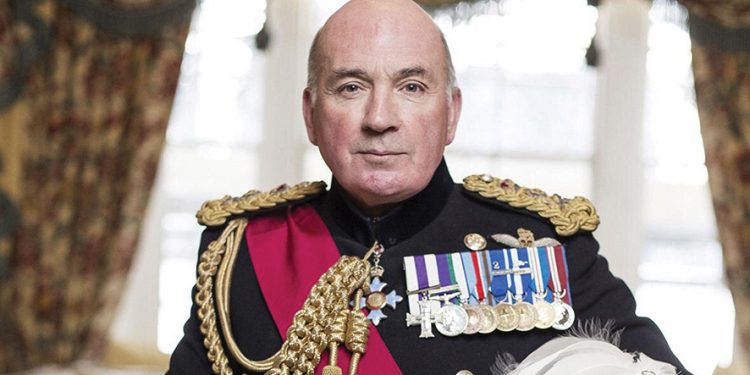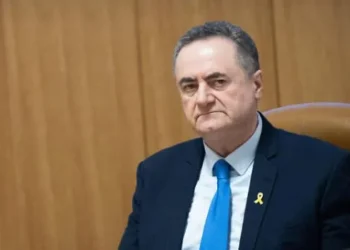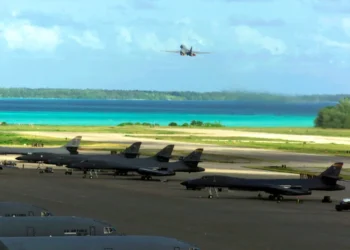We have to recognize that the Ukrainian army has worked extremely hard, at much expense in terms of casualties, over the summer months. But I think it’s fair to say the West was slow to decide to give Ukraine the weapons it needed to launch this counter offensive, – General Lord Sir Richard Dannatt, former Chief of the General Staff of UK Armed Forces, tells Radio Free Europe’s Georgian Service. “It took a long time to decide to send tanks, armored infantry fighting vehicles, self-propelled artillery, sufficient ammunition, long range artillery, and drones. And indeed, it took quite a long time for Ukrainian forces to be trained in how to use that equipment. And while that was going on, the Russians were not idle: They spent the same period of time preparing comprehensive defensive positions, up to three lines of defense in many parts of the 1000km frontline, which has proved very difficult for the Ukrainian forces to penetrate,” he adds.
“There are areas, at some cost, where Ukrainian forces have managed to penetrate the first line, at places the second line of defense, but the thought and the hopes of early summer that Ukrainian forces, equipped with Western tanks and other equipment, would be able to not just break through the Russian lines, but to get into the Russian rear areas and cause the same kind of panic that we saw in September last year in the north of the country- that hasn’t happened yet. It’s not for want of Ukraine’s trying. But I’m afraid it’s a reflection of the fact that the Russians have prepared very deep and very comprehensive defensive positions. With the onset of autumn and winter, and the poor weather coming, I think the likelihood of there being a decisive move on the battlefield in 2023 looks most unlikely. President Zelensky and the Ukrainian military have got to prepare for a much longer conflict, that neither they or their Western allies would have wished for. That’s where we are now. No criticism at all of the Ukrainian military, but simply a reflection of the fact that the Russians prepared proper defensive positions. And they have proved very difficult to penetrate.”
What must it feel like for the Ukrainian military leadership and President Zelensky to be constantly asking the Western Allies for what they need?
This has been a very frustrating process for President Zelensky and his senior leadership team, both the political leadership and the military leadership. Yes, eventually, the West has been giving much of what Ukraine asked for, but that gifting has been slow, and valuable time has been lost. And while that valuable time was being lost to Ukraine, the Russians made good use of it by preparing these comprehensive defensive positions. And we are in the same position now, with discussion about the availability of F-16 aircraft or other modern fighter aircraft for Ukraine. It is almost as if the West is trying to control the capability and capacity of Ukraine to really carry out its mission of freeing its sovereign soil from the Russian occupier. It’s almost as if the West is pulling the strings, and only allowing Ukraine to do what the West is willing to allow it to do. Now, of course, there is concern about escalating the war, that if the West and NATO provide so much, and particularly if the war is then carried onto Russian soil, that it plays into the Russian political agenda of claiming that this is a war in which they are defending themselves against Western aggression, that NATO all along has been intending to attack Russia. Of course, that would be false. Yet, when you are at war, it is perfectly legitimate, in exactly the same way that Russia is hitting Ukrainian cities, factories, infrastructure, and the like, and has been doing so since the war began, for Ukraine to strike targets within or dive into Russia. That is perfectly reasonable in order to degrade the Russian military capability. It’s a facet of modern war. While it is a war limited in aims and limited in geography, it is certainly not limited in means, and there shouldn’t be limits imposed on Ukraine to try and prevent it from attacking targets in Russia. If anything, it’s important that the Russian people know that this isn’t a war being carried on by “other people over there,” this is something that affects them as well.
While on active duty, if you had been asked to conduct such a counter offensive without appropriate air support, would you have done it?
If the government of my country had required me to carry out such an attack, then, of course, I would. I think the question is, how would one have done it. There should have been a realization that the break-in battle was going to be very bloody, very difficult, and very old fashioned, and maybe more assistance should have been provided with the equipment needed to break through the Russian defensive lines. Such equipment does exist. And maybe that has not been supplied in sufficient quantity. There was a strategic miscalculation that underestimated the strength of the Russian defensive position. The related challenge that the Ukrainian army has had to face is that they’ve had to transform themselves from an army on the defensive, to one capable of carrying out an offensive. And that is very difficult to do during a war and while you’re in contact. No criticism of Ukrainians, their soldiers’ determination, or their willingness to accept casualties, it’s just the hard reality of trying to break in and break through solid defensive positions.
According to the latest reports, Ukraine will be getting ATACMS from the US. How big an impact will they have?
Every better and longer range weapon that Ukraine is provided with, the higher the chance of a major operational impact. We’ve seen it with the well-documented attacks made using British-supplied Storm Shadows. It was probably three Storm Shadow missiles that carried out this week’s hit on the Black Sea naval base. That is the kind of attack that the provision of ATACMS will enable – long range, precise, very effective. And of course, this gets back to the early part of our conversation about it being perfectly legitimate for Ukraine to strike targets deep inside Russia, because Russia started the war, and it must accept the consequences of the conduct of that war.
Ukraine reports that Russia has lost 275,000 troops in Ukraine so far. Even imagining the real number is half that, how many more can Putin afford to lose?
If you take the fact that he attacked with a force of about 180 – 190,000, it seems very likely that he has lost, killed or very seriously injured at least that number. It’s a horrific casualty bill. Ukraine has also suffered horrific casualties, let’s assume between a third and half the number the Russians have lost. It is a very high toll for both countries, bearing in mind that the Russian population is about three times the size of the Ukrainian. It means the provision of manpower by both sides is particularly difficult. Perhaps less difficult for Ukraine, because they have the absolute determination to free their country from an invader. Ukraine will always find people who are willing to go and fight, although that can’t go on forever. But in Russia, it’s a war that many of the soldiers haven’t really got their heart in. The Russian way of using manpower is pretty indiscriminate, with a pretty low regard placed on human life. And over time, it will have a cumulative effect, and it will become increasingly difficult for Putin to find men willing to fight in his war in Ukraine. That is a major area that needs to be worked on, to get as much information through social media channels, through any channel possible, to the Russian population, that this is an illegal war being conducted by the Kremlin elite for their own purposes, that it’s costing a huge number of Russian young men’s lives. This is a message that someone has got to get out there to the Russian people, to change their attitude towards their government. It may have long been the Russian way of war, this complete disregard for human life, but that doesn’t mean to say one should give up on the attempt to try and get a better understanding out to the Russian people. Doing so is much more likely to end this war in Ukraine’s favor.
You have openly stated that the UK should have sent more military assistance than it did. Has that ship now sailed?
Yes. Unless there is a breakthrough before winter settles in, and I would very much like to see that happen, I think we have to accept that the war is going into a deep freeze over the winter, during which time the Russians will continue to improve their defensive positions. And we may find that the frontline solidifies into one that is very difficult to shift.
This then opens up the whole question of how is this conflict then progresses – received wisdom is that conflicts like this are resolved by negotiation, but the negotiation positions of President Zelensky and Vladimir Putin are irreconcilable. Zelensky, quite properly, wants every square kilometer of Ukrainian territory, including Crimea, back under Ukrainian control, while Putin has to get something out of this war, to control at least some proportion of Ukraine’s territory, in order not to appear to the Russian people that he has been defeated. So it’s very difficult to find what the opening positions for a negotiation might be. It’s a challenge that’s going to have to be considered over the course of the next few months. There is also the wider concern that Western support for Ukraine may start to tail off, and what will happen in the United States with the presidential election. President Biden remains very committed to supporting Ukraine, but we don’t know if he will stay as the US president. A lot of people are concerned that Donald Trump might come back. I find that improbable, but the wider point is that there is concern that time is not on Ukraine’s side; time is on Russia’s side. Western support and enthusiasm to support Ukraine will diminish, and that will increasingly put Putin in a stronger position. So it is difficult to see an early conclusion to this conflict. It’s actually also quite difficult to see a medium to long term solution to this conflict. It is conceivable that it could be decided in the same sort of frame that the Korean Peninsula is in.
That war stopped in 1953 as a result of a ceasefire, but there’s no peace agreement, it’s a frozen war. If the same happened in Ukraine, it would not only be disastrous for Ukraine, but for Europe too, because at any moment the Russians could decide to resume their offensive. And then there’s the whole question of who makes good on the damage caused in Ukraine by the Russian attack? We may say it’s on Russia to fix it, but Russia won’t if the conflict is unresolved and it is holding part of Ukrainian territory. What seemed like a reasonable hope in the spring and early summer that there could be a decision in 2023 on the battlefield seems unlikely to happen now. Other ways to resolve the conflict are difficult to imagine.
You wrote that Putin is not just a theoretical threat like Hitler, but an actual threat, and the Ukrainians are buying us time, in blood, to decide how to respond to the new challenges to European security. How is the West using that time?
There is no doubt that Ukraine is paying in its blood for the removal of the threat of Russian aggression to wider Europe. But, assuming that Ukraine wins this war, and the Russian forces withdraw from Ukraine, then has the threat to the security of Western Europe been removed? Or does Russia continue to be a threat to it, or to the Baltic states, or to those countries that border Russia? It’s an unknown. Russia could maintain an aggressive stance towards the West, and so the West is wasting the time that Ukraine is buying it by not increasing its defense spending now, not increasing its military capability now, and putting itself in a better position to deter future Russian aggression. Is the West using the time that Ukraine is buying it wisely, or is it making the same mistake it did in 1930s?
Interview by Vazha Tavberidze














